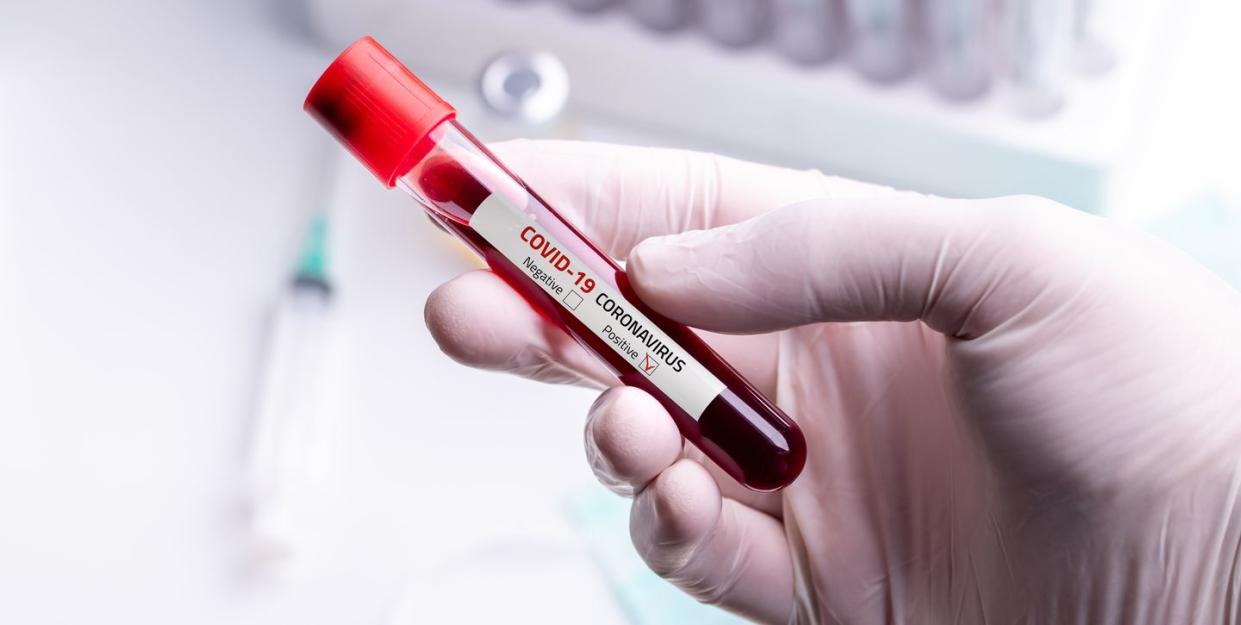Does Blood Type Influence Your COVID-19 Risk? New Research Says It’s Possible

Several preliminary studies have discovered a possible link between a person’s blood type and their COVID-19 risk.
In particular, type O blood appears to be protective, while type A blood may have a greater risk, but doctors say it’s too soon to draw conclusions.
The idea that blood type may dictate your infectious disease risk isn’t completely new, doctors say.
A growing body of research is discovering a potential link between a person’s blood type and their COVID-19 risk. The latest stems via preliminary data from the at-home genetic test kit company 23andMe.
The company shared in a blog post this week that preliminary results from its ongoing genetic study of COVID-19—which currently has more than 750,000 participants—“suggest that O blood type appears to be protective.” Specifically, people with type O blood were up to 18% less likely to test positive for COVID-19 than those of other blood types.
The results were still significant when researchers adjusted for factors like age, sex, body mass index, ethnicity, and other health conditions. That said, the study has not yet been peer-reviewed and published in a scientific journal.
But this isn’t the first time researchers have identified a blood type link. Preliminary results from a study of 2,173 coronavirus patients in China found that people with type O blood had a lower risk of contracting COVID-19, while people with type A and type AB faced a higher risk. In April, researchers from Columbia University also published preliminary data that came to similar conclusions: People with type O blood were less likely to test positive for COVID-19 and those with type A blood were 33% more likely to test positive for COVID-19.
Wait, can blood type really impact your COVID-19 risk?
It’s totally unclear at this point. When you look at the data that’s been collected so far, “the difference from a practical point of view is not very large between the blood types,” says William Schaffner, M.D., an infectious disease specialist and professor at the Vanderbilt University School of Medicine.
An example: Only 233 people out of 478 with type A blood tested positive for COVID-19 in the Columbia University study (48%), while 312 of 761 with type O blood (or 40%) also tested positive.
Plus, the idea that your blood type may dictate your infectious disease risk isn’t completely new, explains infectious disease expert Amesh A. Adalja, M.D., senior scholar at the Johns Hopkins Center for Health Security. “Blood type can sometimes be correlated with susceptibility to different infectious diseases,” he says. “It’s generally true that genetics do play a role in who is more or less likely to be infected with any organism.”
For instance, people with certain blood disorders like sickle cell disease are resistant to malaria, Dr. Adalja says. Research has also found that people with type O blood may be more susceptible to norovirus, which causes stomach flu.
Different blood types have different features, like certain proteins that can impact how your blood circulates, explains Nicholas Tatonetti, Ph.D., assistant professor of biomedical informatics at the Columbia Initiative for Systems Biology, and co-author of the Columbia University study on COVID-19 and blood type. But it’s unclear why, exactly, that may have an impact on your disease risk, he says.
Your blood type is determined by your genetics, and it’s possible that it is simply affiliated with something else in your body (and in those who share your blood type) that influences how you respond to the virus, Dr. Schaffner says. It could be that people with type O blood have some other shared factor in common that lowers their risk of COVID-19—experts just don’t know what it is.
It’s also important to stress that correlation does not equal causation. “Just because two things are linked does not mean that one causes the other,” Dr. Schaffner says. “They may just be linked coincidentally and there’s something else going on that needs to be investigated.”
Right now, all of these findings are preliminary, so it’s difficult to draw any concrete conclusions.
Even if further research does determine that people with type O blood have a lower susceptibility to COVID-19, it doesn’t mean you’re suddenly 100% protected from contracting the virus.
“It’s not that you’re impervious to infection, it’s that you might have more resistance to infection,” Dr. Adalja says, adding that you would still likely have some risk.
Despite the findings, doctors still stress the importance of following federal and state guidelines to reduce your risk of contracting and potentially spreading COVID-19—regardless of your blood type, Dr. Schaffner says. Continue to practice social distancing, wash your hands, wear a mask in public, and get tested if you can.
Support from readers like you helps us do our best work. Go here to subscribe to Prevention and get 12 FREE gifts. And sign up for our FREE newsletter here for daily health, nutrition, and fitness advice.
You Might Also Like

